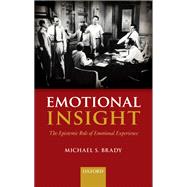
Emotional Insight
by Michael S. BradyRent Textbook
Rent Digital
New Textbook
We're Sorry
Sold Out
Used Textbook
We're Sorry
Sold Out
Summary
But how are we to understand the positive contribution that emotions can make to our beliefs in general, and to our beliefs about value in particular? And what are the conditions in which emotions make such a contribution? Emotional Insight aims to answer these questions. In doing so it illuminates a central tenet of common-sense thinking, contributes to an on-going debate in the philosophy of emotion, and illustrates something important about the nature of emotion itself. For a central claim of the book is that we should reject the idea that emotional experiences give us information in the same way that perceptual experiences do. The book rejects, in other words, the Perceptual Model of emotion. Instead, the epistemological story that the book tells will be grounded in a novel and distinctive account of what emotions are and what emotions do. On this account, emotions help to serve our epistemic needs by capturing our attention, and by facilitating a reassessment or reappraisal of the evaluative information that emotions themselves provide. As a result, emotions can promote understanding of and insight into ourselves and our evaluative landscape.
Author Biography
Michael S. Brady is Senior Lecturer in Philosophy at the University of Glasgow, having previously taught at the University of Stirling. He has published in moral philosophy, epistemology, and the philosophy of emotion, and has edited two volumes of essays on the Moral and Epistemic Virtues (with Duncan Pritchard) and on New Waves in Metaethics. He is currently Co-Investigator on an interdisciplinary project on the nature of pain at Glasgow. He is Director of the British Philosophical Association, having previously served as Secretary of the Scots Philosophical Association. He is on the editorial board of The Philosophical Quarterly, and subject editor for Oxford Bibliographies.
An electronic version of this book is available through VitalSource.
This book is viewable on PC, Mac, iPhone, iPad, iPod Touch, and most smartphones.
By purchasing, you will be able to view this book online, as well as download it, for the chosen number of days.
Digital License
You are licensing a digital product for a set duration. Durations are set forth in the product description, with "Lifetime" typically meaning five (5) years of online access and permanent download to a supported device. All licenses are non-transferable.
More details can be found here.
A downloadable version of this book is available through the eCampus Reader or compatible Adobe readers.
Applications are available on iOS, Android, PC, Mac, and Windows Mobile platforms.
Please view the compatibility matrix prior to purchase.
